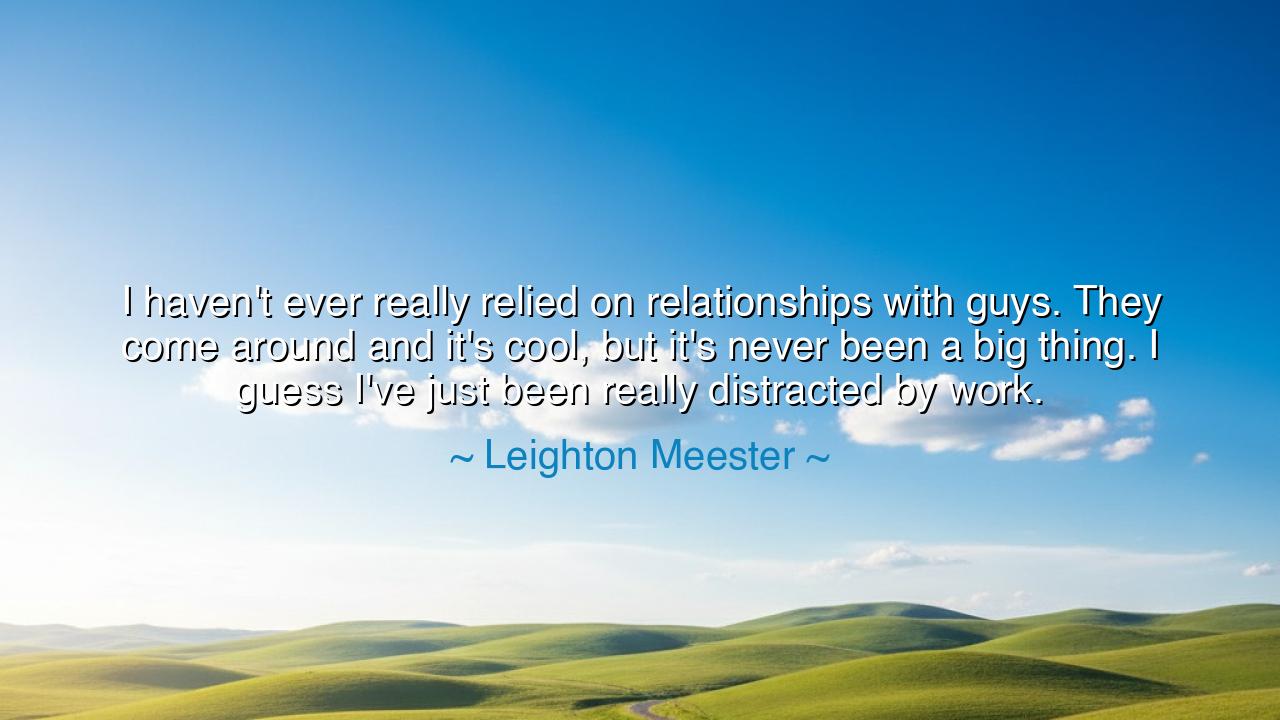
I haven't ever really relied on relationships with guys. They
I haven't ever really relied on relationships with guys. They come around and it's cool, but it's never been a big thing. I guess I've just been really distracted by work.






In the quiet moments of life, when the world is still, there arises a profound understanding of self—an understanding that leads one to see that true fulfillment does not come from the fleeting relationships with others, but from the work we pour our hearts into. Leighton Meester’s words, "I haven't ever really relied on relationships with guys. They come around and it's cool, but it's never been a big thing. I guess I've just been really distracted by work," speak to a powerful truth: the essence of life’s meaning lies not in the transient connections we may form, but in the dedication we offer to purposeful pursuits.
Throughout the ancient world, there were those who understood that life is a journey shaped by individual dedication, not by the whims of external affection. The great philosopher Aristotle spoke of the highest form of happiness—the one that arises from self-sufficiency and the pursuit of virtue. He argued that those who rely too heavily on the approval or companionship of others fall into a trap of unsettledness, always seeking external validation instead of fostering their inner strength. Leighton’s words reflect this same wisdom: that while relationships may come and go, true contentment is found in the focus we give to our own growth and purpose.
In ancient Greece, the Stoics—figures like Seneca and Epictetus—taught that the pursuit of one's inner peace and wisdom should never be swayed by the fickle nature of external circumstances. They believed that one should cultivate independence of spirit, relying not on the favor of others, but on the integrity of one's own actions. Leighton Meester, by acknowledging that relationships are "cool" but not central to her life, echoes this Stoic ideal. She acknowledges the transient nature of romantic connections but places the anchor of her life in her work—her passion, her craft, her purpose.
This philosophy is not one of dismissal of relationships but of understanding their place in the grand design of life. Mahatma Gandhi, whose life was a testament to dedication to higher purpose, lived with a singular focus on the freedom of India. While he valued the relationships in his life, it was his work—the driving cause of his heart—that took precedence. He understood that to truly serve others, to make an everlasting impact on the world, one must first serve oneself—not through selfishness, but through a sustained commitment to one’s calling.
Leighton’s statement also speaks to a modern truth that many fail to grasp: in the rush for love and connection, many lose themselves, forgetting that true self-actualization often comes through solitary work, through dedication to a personal mission. Whether it is in the creation of art, the pursuit of a scientific discovery, or the building of a business, the greatest contributions to the world are often made by those who place work above fleeting distractions. In this way, work becomes not just an occupation, but a calling, a purpose that aligns one’s soul with something greater than transient affection.
The lesson here is clear: to find true contentment, we must not place all our hopes in relationships, no matter how rewarding they may seem. The focus of our lives should not be on what comes and goes, but on what endures—the work that shapes us and leaves behind a legacy. As Ralph Waldo Emerson wrote, "The only way to have a friend is to be one." And in that spirit, the work we dedicate ourselves to is our truest friend, the constant companion that remains by our side, nurturing our growth, even when all else may fade.
The practical action here is to embrace the work that stirs your soul, the passions that speak to you in a language only your heart can understand. Dedicate yourself to something that calls you beyond the superficial, beyond the transient connections that may distract you. Build your foundation on something lasting: your craft, your art, your purpose. And in doing so, you will find that while relationships may come and go, the fulfillment derived from purposeful work will remain, steadfast and unyielding, as the pillar of a life well lived.






AAdministratorAdministrator
Welcome, honored guests. Please leave a comment, we will respond soon